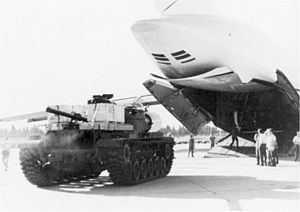
Back عملية عشب النيكل Arabic Operation Nickel Grass Danish Operation Nickel Grass German Opération Nickel Grass French מבצע ניקל גראס HE Operazione Nickel Grass Italian ニッケル・グラス作戦 Japanese Operação Nickel Grass Portuguese Nickel Grass Russian Operation Nickel Grass SIMPLE
| Operation Nickel Grass | |||||||
|---|---|---|---|---|---|---|---|
| Part of the Yom Kippur War | |||||||
 An M60 tank being unloaded in Israel by a C-5 Galaxy of the United States Air Force during the 1973 Arab–Israeli War | |||||||
| |||||||
| Belligerents | |||||||
|
|
| ||||||
| Casualties and losses | |||||||
| None | None | ||||||
Operation Nickel Grass was the codename for a strategic airlift conducted by the United States to deliver weapons and supplies to Israel during the 1973 Arab–Israeli War. Between 14 October and 14 November of that year, the Military Airlift Command of the United States Air Force shipped approximately 22,325 tons of supplies, including tanks, artillery, and ammunition, in multiple flights of C-141 Starlifters and C-5 Galaxys.[1][2]: 88 This initiative was undertaken to help improve the position of the Israeli military in the face of a large-scale joint offensive by Egypt and Syria, both of which had been receiving extensive support from the Soviet Union.[1]
On 19 October, nearly two weeks after Egypt's Operation Badr, the United States pledged to support Israel's fight against the Arab countries. Earlier, the Organization of Arab Petroleum Exporting Countries (OAPEC) had reached an understanding to use the "oil weapon" to give the Arab side an advantage in the Arab–Israeli conflict. Following the outbreak of hostilities, OAPEC's members, led by Faisal of Saudi Arabia, proclaimed the implementation of a total oil embargo against the United States and other countries that had provided any form of support to Israel to defend against the Arab military offensive. This, along with the contemporaneous failure of major pricing and production negotiations between the exporters and the major oil companies, led to the 1973 oil crisis. Nevertheless, Israel continued to receive support and the war came to an end on 25 October following a ceasefire. OAPEC lifted the embargo in March 1974. The economic impact of the oil crisis influenced the future decisions of American policymakers and decisively reshaped the United States' external policies, especially in the Middle East. The American airlift to Israel and the Arab embargo of the United States greatly transformed the dynamic of the Saudi Arabia–United States relationship.[3]
- ^ a b Cite error: The named reference
AFA_Nickel_Grasswas invoked but never defined (see the help page). - ^ Dunstan, Simon (2007). The Yom Kippur War: The Arab-Israeli War of 1973. Bloomsbury USA. ISBN 9781846032882.
- ^ Arnon Gutfeld and Clinton R. Zumbrunnen, "From Nickel Grass to Desert Storm: The Transformation of US Intervention Capabilities in the Middle East." Middle Eastern Studies 49.4 (2013): pp. 623-644.